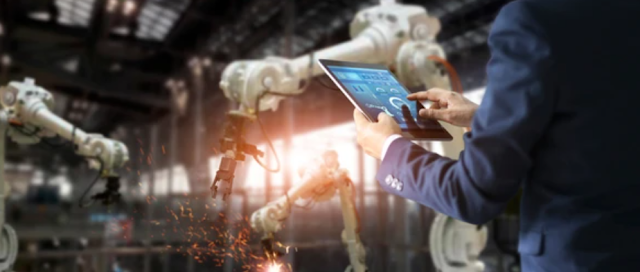AI in Manufacturing: Optimizing Processes and Automation
AI (Artificial Intelligence) is revolutionizing the manufacturing industry by optimizing processes and enabling automation. With the integration of AI technologies, manufacturers can enhance productivity, improve efficiency, and achieve greater accuracy and precision in their operations. Here is a detailed exploration of how AI is transforming the manufacturing sector.
Predictive Maintenance:
AI algorithms can analyze sensor data, equipment performance, and historical maintenance records to predict equipment failures and optimize maintenance schedules. Machine learning models can identify patterns and anomalies in data, enabling manufacturers to detect potential issues before they occur. Predictive maintenance reduces downtime, minimizes unplanned maintenance costs, and increases overall equipment effectiveness.
Quality Control and Inspection:
AI-powered computer vision systems can inspect products and identify defects or anomalies in real-time. Machine learning algorithms analyze visual data and compare it against predefined quality standards to ensure product quality and consistency. AI-driven quality control systems improve accuracy, reduce human error, and enhance overall product quality.
Process Optimization:
AI algorithms optimize manufacturing processes by analyzing data from various sources, including sensors, production lines, and historical records. Machine learning models can identify inefficiencies, bottlenecks, and areas for improvement, allowing manufacturers to optimize production workflows and reduce waste. AI-driven process optimization increases efficiency, reduces costs, and improves overall operational performance.
Supply Chain Management:
AI technologies improve supply chain management by analyzing data related to inventory levels, demand forecasts, and supplier performance. Machine learning algorithms can optimize inventory management, streamline logistics, and improve demand forecasting accuracy. AI-powered supply chain management systems enhance efficiency, reduce lead times, and minimize costs across the supply chain.
Autonomous Robots and Automation:
AI enables the deployment of autonomous robots and automation in manufacturing processes. AI-powered robots can perform repetitive tasks with high precision and accuracy, reducing the need for human intervention. Machine learning algorithms allow robots to learn and adapt to changing environments, improving their efficiency and productivity. Automation through AI enhances production speed, reduces errors, and frees up human workers for more complex tasks.
Resource Optimization:
AI algorithms can optimize resource allocation in manufacturing operations. Machine learning models analyze data on energy consumption, material usage, and production schedules to identify areas where resources can be optimized. AI-powered resource optimization leads to cost savings, reduces waste, and promotes sustainability in manufacturing processes.
Demand Forecasting and Inventory Management:
AI algorithms can analyze historical sales data, market trends, and other relevant factors to forecast demand accurately. Machine learning models enable manufacturers to optimize inventory levels, reduce stockouts, and avoid excess inventory. AI-driven demand forecasting and inventory management improve customer satisfaction, reduce costs, and minimize inventory holding expenses.
Product Design and Customization:
AI technologies facilitate product design and customization in manufacturing. Generative design algorithms use AI to explore and generate multiple design options based on specified parameters. AI-powered systems can also enable mass customization, where products are tailored to individual customer preferences. AI-driven product design and customization enhance innovation, increase customer satisfaction, and drive competitive advantage.
The implementation of AI in manufacturing brings significant benefits, including increased productivity, improved quality, optimized resource utilization, and reduced costs. However, manufacturers need to address challenges such as data security, integration complexity, and workforce readiness to fully leverage the potential of AI technologies.
In conclusion, AI is transforming the manufacturing industry by optimizing processes, enabling automation, and driving operational efficiency. As AI continues to advance, manufacturers have the opportunity to achieve greater productivity, improve product quality, and unlock new levels of innovation and competitiveness












